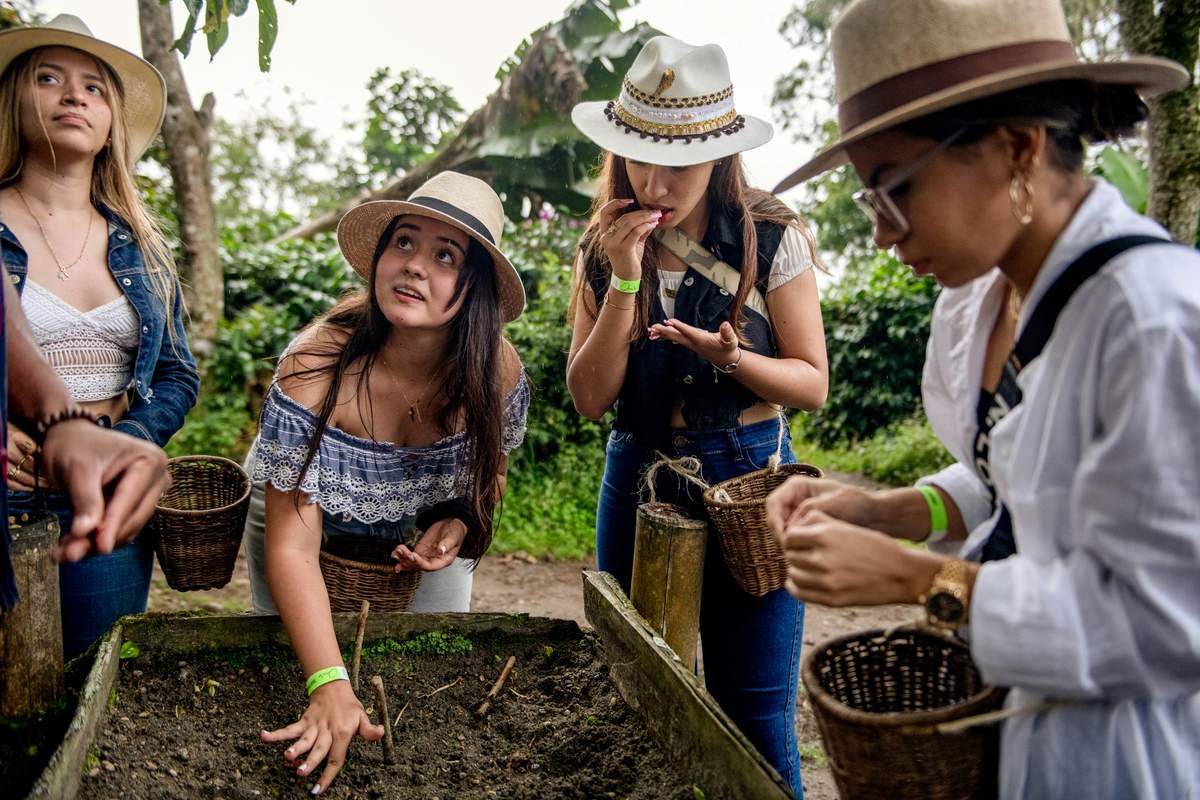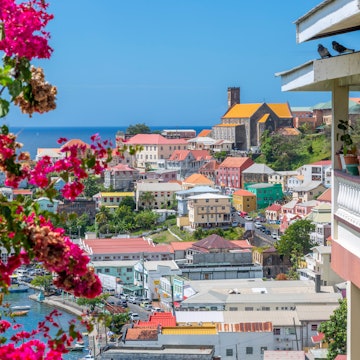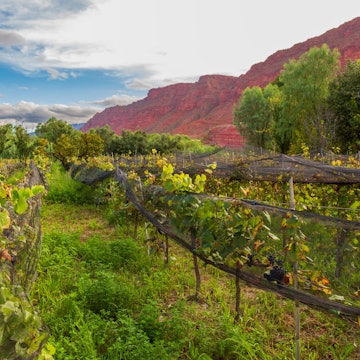

Enjoy panoramic views of the city from the El Poblado neighborhood. Simon Mayer/Shutterstock
Splashed with brick towers, soaring green trees, and the Andes Mountains along its outer edges, Medellín’s skyline is a visual spectacle. The many constants throughout the “City of the Eternal Spring” include the scent of buñuelos (fried dough fritters) wafting from hole-in-the-wall restaurants and street stands, thumping reggaeton blasting from cars zooming by, and the kindness of the paisa people at every possible turn.
Each neighborhood in Medellín offers its own unique flavors and experiences. In total, travelers have 16 communes (locally, comunas) to explore, many with distinct neighborhoods within. Some give an unhindered glimpse of frills-free Colombian life, others are glamorous nightlife and shopping utopias, and so many – within a city that was once written off as one of the most dangerous in the world – put Medellín’s incredible comeback on full display. While you may not be able to explore them all in one trip, load your itinerary with as many of these neighborhoods as possible to feel its magical energy.
1. El Poblado/Provenza
Best neighborhood to be pampered (and party)
El Poblado is an upscale and sensory experience all on its own. The upper-class neighborhood is home to some of the city’s best malls (such as Santafé and Oviedo along the Golden Mile or Milla de Oro), trendiest hotels – The Charlee and Click Clack – and celebrated restaurants, including Carmen and Elcielo. For nightlife, this is among the city’s elite destinations, with an abundance of rooftop bars, clubs and, yes, even a bar with a ball pit in the middle for you to jump into.
Parque Lleras is the nightlife epicenter, with oodles of raucous options lining it that stay open until the wee hours of the morning. If you decide to stay in El Poblado, you don’t have to stay right in Parque Lleras to make the most of your experience either. Spots along the Milla de Oro, such as Hotel Poblado Plaza or Sites Hotel on the western edge of the barrio, provide a quieter night’s sleep, upscale amenities and still seamless access to the El Poblado good life.

2. Laureles
Best neighborhood to experience an upscale, residential side of Medellín
A bit less glitzy and in your face than El Poblado is the middle to upper-class Laureles neighborhood. Here you can enjoy several beloved restaurants and cafes – examples include Rituales, Bárbaro Cocina Primitiva and Crepes y Waffles – as well as upper-scale lodging offerings like Factory Lofts and Inntu Hotel.
There are two quintessential Medellín experiences to be had in Laureles. The first is a trip to Estadio Atanasio Girardot, the home stadium of Colombia’s most beloved soccer team, Atlético Nacional, and its bitter rival, Deportivo Independiente Medellín. If no soccer is happening, this is still a stellar people-watching spot, with a skateboard park, outdoor gym, beach volleyball courts, and food stalls scattered about. The second must is a stroll down La 70 (La Setenta) just south of the stadium. This big-time party street is loaded with bars, mom-and-pop restaurants, and street vendors galore. If you want to party like a local, grab a bottle of aguardiente at a liquor shop along La 70 on any Friday or Saturday night, cozy up at a table out on the street and make some friends.

3. El Centro
Best neighborhood for the daytime hustle and bustle
El Centro embodies the hecticness you’d expect in any major South American city. The buzzing neighborhood (translating to “The Center”) very much lives up to its name and is a primary economic artery for locals and tourists alike. Here you’ll find the heart of the city – the Fernando Botero statue-clad Plaza Botero in front of the Antioquia Museum – which is a quick stroll from the Parque Berrio metro station. From there, walk down Calle Bolivar to experience merchants urging you to buy some homemade tinto (coffee) from stalls, cheap clothes, and souvenirs.
Along Avenida San Juan, you can snag photos at Plaza Cisneros – which features 300 light poles reaching up to the sky – as well as the Alcaldía de Medellín complex (Medellín’s town hall) that has a handful of public art displays. There is so much to explore in El Centro – do so during the day, stay vigilant, and don’t wander around it at night.
4. Ciudad del Río/Barrio Colombia
Best neighborhood for a local nightlife experience
Wedged just east of the Industriales and Poblado metro stations, Barrio Colombia and Ciudad del Río have quickly become places to visit. By day, Barrio Colombia is very much a graffiti art-draped warehouse district - primarily colored with automotive shops as well as one of the best malls and coffee shops in town (Premium Plaza and Distrito Cafetero, respectively). By night, you’ll find some of the city’s most bumping clubs, including the LGBTIQ+-friendly Industry Club and Discoteca Amarna.
Tucked south of the massive, river-adjacent Bancolombia building (you can’t miss it) is a handful of cultural musts in the Ciudad del Río area. These include Mercado del Río, Medellín’s biggest food hall, and the Medellín Modern Art Museum. Ciudad del Río has a handful of hotels – for its metro accessibility and central location, this is a nice base for getting to all Medellín has to offer.

5. San Javier
Best neighborhood for a tour (and Instagram-worthy pics)
Getting to San Javier is half the fun. The Metrocable – Medellín’s gondola lift system that reaches its mountainous neighborhoods – has a stop in the heart of San Javier (also known as Comuna 13). During the reign of Medellín’s most notorious drug lord, San Javier was arguably its most dangerous neighborhood. Today, it is a major tourist and tour destination for its omnipresence of graffiti art and escaleras electricas, outdoor escalators that weave through its hills to help locals with their commute. While walkable by day, you’ll want to hire a tour guide to help you navigate San Javier’s network of tight streets and ensure you get the full backstory of its transformation.
6. Manrique
Best neighborhood to see Medellín’s transformation in progress
It will take a steep, hilly taxi ride to venture to this Eastern barrio, but it’s worth it. Once regarded as a crime-ridden neighborhood to avoid, you can see new life being breathed into this lower-income neighborhood with community playgrounds and public paintings of local icons.
At Manrique’s core is the spirit of tango. Along its main drag, Carrera 45, is a statue of famed French-Argentinian singer and tango extraordinaire Carlos Gardel, who loved Medellín and tragically died in a plane crash in 1935. The statue, which is adjacent to a colorful, flower-clad staircase, is just the beginning of the barrio's love for tango and colorful murals. To fully grasp the barrio’s history as well as Gardel’s, hit the Casa Gardeliana history museum. Within Manrique, you’ll also find El Balcón de Los Artistas, a homegrown dance school with regular community performances that is churning out world-class talent who have gone on to perform with the likes of Jennifer Lopez and Marc Anthony. As with so many other areas of Medellín, you’ll leave Manrique totally inspired.
















